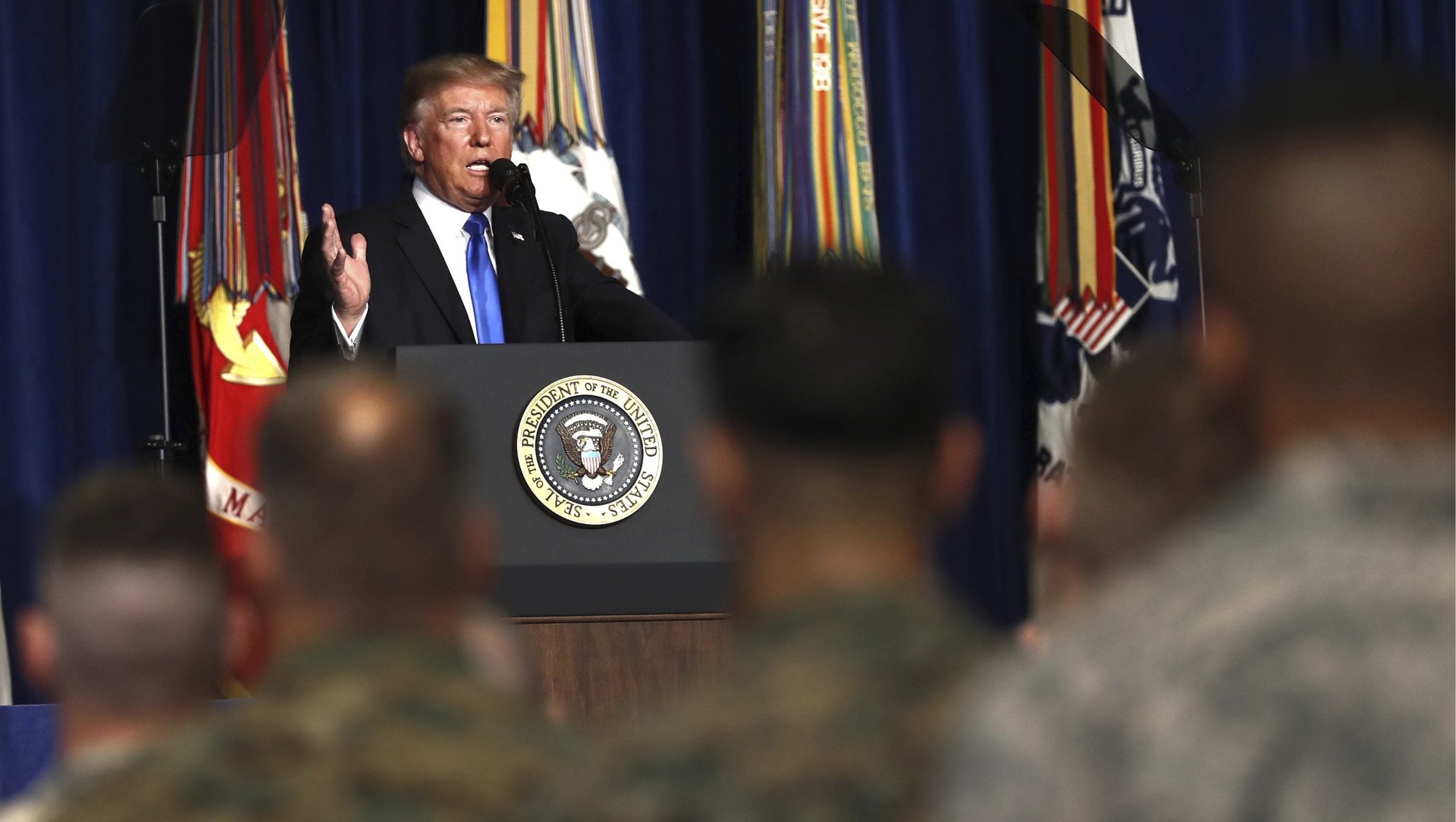On Afghanistan, Trump promised to listen to his gut. Instead, he lost his nerve
Last night during prime-time, US president Donald Trump delivered one of his most serious speeches as commander-in-chief, attempting to persuade the American people that the security situation in Afghanistan is “unacceptable” and that the United States couldn’t allow it to deteriorate any further. “The American people are weary of war without victory,” Trump remarked, and US foreign policy over the last several administrations have contributed mightily to that weariness.


Last night during prime-time, US president Donald Trump delivered one of his most serious speeches as commander-in-chief, attempting to persuade the American people that the security situation in Afghanistan is “unacceptable” and that the United States couldn’t allow it to deteriorate any further. “The American people are weary of war without victory,” Trump remarked, and US foreign policy over the last several administrations have contributed mightily to that weariness.
Presumably, Trump is fairly confident that his new strategy for the war will get things back on track.
A big problem, of course, is that what Trump outlined in his address last night is not new at all. The missions and the objectives—advising and training the Afghan security forces; grinding the Taliban through US airstrikes and counterterrorism raids; weakening the insurgency enough that its leadership will have no choice but to sue for a peace settlement—are the very same missions and strategies that Barack Obama pursued during his eight years as president. The only factor that can distinguish Trump’s Afghanistan plan from his predecessor’s is that Trump possesses an almost involuntary trust in the military men surrounding him. Obama was often skeptical of what the US military wanted; Trump appreciates military advice so much that he has stocked generals and colonels in his cabinet and White House.
Trump’s entire case for more American involvement rested not on what the US hopes to accomplish in Afghanistan, but rather why America can’t afford to leave. He brought up the Barcelona attacks last week—an attack that any jihadist with a low IQ with access to a crappy vehicle could conduct—as a way to scare Americans into believing that a US withdrawal would produce more Barcelonas in more countries. The fact that none of the twelve reported members of the cell in Spain ever trained in Afghanistan or have even traveled to South Asia before wasn’t mentioned. Nor was there a realization from the president that no amount of “fire and fury” against Al-Qaeda and ISIS on Afghan soil would do anything to address magically the tens of thousands of suspected extremists who are already in the west.
Trump didn’t dive too much into the details, but his strategy is essentially a collection of tactics all rolled into something that could be described as a plan. Thousands of additional US troops will be deployed to train more Afghan soldiers and police officers over an indeterminate period of time. Meanwhile, US pilots will be able to target more bad guys in more groups, and commanders in the field will be given increased authority and looser rules of engagement in order to pummel any jihadist that is walking, breathing, or talking in Afghanistan. US troops will only withdraw when the conditions permit, not when a certain date on the calendar is scratched off. What those conditions are, Trump didn’t say.
Towards the beginning of the speech, Trump commented that his “original instinct was to pull out.” Indeed, anybody who has taken a glance at Trump’s earlier remarks about the war wouldn’t see this as a surprise; at various times over the previous six years, the real-estate mogul-turned-commander-in-chief questioned whether the US received a big enough return on its enormous investment. In Oct. 2011, he tweeted “When will we stop wasting our money on rebuilding Afghanistan? We must rebuild our country first.” In Aug. 2012, Trump posted a tweet calling Afghanistan “a complete waste.” Indeed, it was only when Trump decided to run for the Republican presidential nomination that his views on the war became a little more hawkish. Even then, he frequently reminded Americans that Afghanistan sucked up hundreds of billions of dollars in taxpayer money that could have been devoted to rebuilding the country’s crumbling roads, bridges, tunnels, and airports.
Trump’s skepticism towards the mission in Afghanistan continued after he was inaugurated. According to Politico, Trump rejected National Security Adviser H.R. McMaster’s plan to increase American troops by several thousand—a decision that served as a testament to his reluctance to continue a conflict that was approaching its 16th anniversary. NBC News reported that he considered firing the US commander there.
In the end, Trump went with the judgment of his national security team rather than the feeling in his gut. How tragic would it be if, four years later, Trump’s gut for the first time proved to be right?